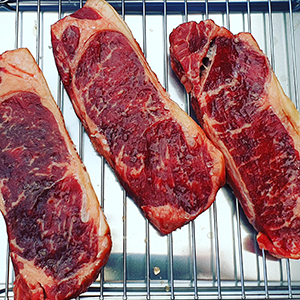Three reasons to try the ketogenic diet, in addition to weight loss
Keto is known for its ability to shed body fat, but that's just one of many impressive health benefits.
Posted on July 18, 2020
Without assuming too much, I think it is safe to say that most people first encounter low-carb diets like the ketogenic diet in the context of losing weight.
And for a good reason. Everyone that has tried to get in shape and lose weight using established, traditional methods like low-fat diets or Weight Watchers knows how hard it can be.
Constant hunger and cravings. Mood swings and low energy. A potential decrease in muscle mass.
In short, it takes a tremendous amount of will-power and discipline.
While weight loss will always be about maintaining a caloric deficit, we can make it easier or harder for ourselves. What if you could calorie restrict yourself without having to endure the hunger and loss of muscle?
With a properly executed keto diet, that is just what you will get. Which probably explains why so many people that try it get so hooked.
Keto often becomes more of a sustainable lifestyle than a diet.
That said, the ketogenic diet is not primarily a weight loss diet. It is about allowing yourself to heal from the inside out. To become a sharper version of yourself, better equipped to withstand the typical health problems prevalent in today's society.
Nothing comes for free, and that goes for keto as well. You have to give some things up, and probably change a few habits in the process.
You might have heard that keto is stricter than low-carb, and that is true. It's not just white rice, bread, and pasta that goes out of the window, but many other starchy foods as well.
So, before we proceed to the advantages and benefits, here are some words of warning.
For starters, keto is all about eating fat, preferably from animal sources.
While there are folks who claim to have successfully implemented a vegan version of the ketogenic diet, you would have to be even more restrictive with what you eat to experience all of the benefits listed below.
Optimally, you should follow these macros:
That is a lot of fat. I know. And it's a dealbreaker for many people, especially if you belong to the generation that got brain-washed by the food industry into thinking that fat is evil.
Skip as many processed foods as you can. Focus on whole foods, along these lines:
Of course, you can spice it up with condiments, onions, and other ingredients of your liking, but stay true to the baseline.
Wait; what? No bacon, heavy cream, cheese, or nuts? Sure, you can have that, too. Just make sure that they don't replace the foods listed above as your foundation.
When I first started with the keto diet, I made the rookie mistake of desperately holding on to old habits. I made keto bread, keto desserts, and other abominations that all had two things in common:
These days, I prefer to avoid these "alternatives" altogether and indulge in the occasional cheat day or two instead. Just be careful that you don't cheat too often; definitely not more than once a month.
Finally, if you are serious about getting the effects below, you will need to keep your alcohol consumption down to a minimum. Even more so if your primary concern is weight loss.
As soon as your liver detects alcohol in your system, the priority changes from metabolizing fat to get rid of the alcohol.
Great, you made the right choice. The foods we eat in the ketogenic diet are not only healthy and nutritious: they also taste delicious.



Did I hear someone say that keto is limiting?
Juicy steaks, fresh fish, and crispy greens. Does that feel limiting to you? It sure doesn't to me. And that's just the beginning. Here's what you will get if you stick with the protocol over time.
On a regular, carb-based diet, every meal results in a rise in glucose levels in your bloodstream. The pancreas responds by producing insulin, which tells the body to metabolize the glucose to release energy, or to stores it in your fat cells for later use.
On the ketogenic diet, your body switches from burning glucose to burning fat, and the low carb intake keeps the insulin production down. While this means no spikes in blood sugar and no sugar crashes after lunch, it also signals to the fat cells that it's ok to utilize that stored energy.
Fat is also more satiating than carbs. A meal with 800 calories at 80 E% fat will keep you full longer than a meal consisting of 60 E% carbs. This satiation, combined with low, even blood sugar, makes it so much easier to maintain a caloric deficit on keto than other diets.
Most of all, I love keto because of the way it makes me feel. It rids me of brain fog and enhances overall cognitive ability. When I am well-rested and have a clear goal set, it can sometimes feel like I am approaching Limitless territory in terms of mental performance.
Other days it's more subtle. I might not even realize I have mental fogginess, but then it clears up, and suddenly it feels like my brain is a supercomputer.
Another beautiful thing about being able to focus effortlessly is that meditation becomes more natural. Which, in turn, improves your ability to focus even further.
This one comes with a caveat, though—some people experience flu-like symptoms during the adaptation phase, where they might feel everything but mental sharpness.
If that happens to you: hang in there, the reward is coming.
Doctors have been using the ketogenic diet as a treatment for intractable epilepsy since the 1920s. Today, keto is more relevant than ever as a complementary treatment. In some cases, as with Type 2 Diabetes, it could even be the primary treatment. [1]
With an established association between chronic, low-grade inflammation and cardiovascular disease [2], a healthy diet is an easy way to make you less susceptible to suffer these conditions.
The ketogenic diet is rich in anti-inflammatory foods, such as grass-fed butter, salmon, and green leafy vegetables, making it a great choice for living a long, healthy life.
Metabolic syndrome refers to a cluster of risk factors known to dramatically increase the risk of developing diabetes, heart disease, stroke, or all three. In the U.S. alone, about 25% of the adult population has metabolic syndrome, a proportion increasing with age, particularly among racial and ethnic minorities.
Typical risk factors include:
The good news is that there is science-backed evidence that the ketogenic diet is incredibly useful for treating all of these symptoms. [3], [4]
While not yet scientifically proven, the use of the ketogenic diet as one aspect of cancer treatment is another field gaining traction. [5]
Cancer cells rely heavily on glucose for their metabolism, but cannot use ketone bodies for fuel. So while being in ketosis not only denies cancer its favorite food source, it may also improve the effectiveness of chemotherapy and radiation.
Always consult your physician before making any significant changes to your diet. Especially if you have a history of medical conditions. And never rely solely on keto to treat terminal diseases.
While scientific studies on the long-term benefits of the ketogenic diet are lacking, there's plenty of anecdotal evidence.
People have lost weight and gotten rid of eating disorders such as sugar addiction and overeating.
Others have successfully used it to improve medical conditions or to reverse chronic inflammation and other risk factors.
Regardless of your goals and potential health issues, the ketogenic diet provides benefits beyond what many other diets can provide.
That said, if you are currently on a regular diet, you will have to make adjustments to your eating habits and maybe give up a favorite food or two. And if you are scared of fat or your primary driver is weight loss alone, there are less demanding alternatives.
But—if you are looking for a way to maximize your health and performance, then keto is definitely for you.
Join my mailing list and get notified whenever a new post is out.
Topics range from personal development, to fitness and nutrition. In short – everything that makes up a sustainable healthy lifestyle.
I won't spam you, and you can unsubscribe at any time.
A welcome email is on the way – please check your spam folder if it doesn't show up.
And to ensure that you don't miss anything in the future, add secondhalfcrusher@gmail.com to your trusted senders in your email program.